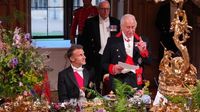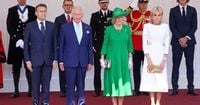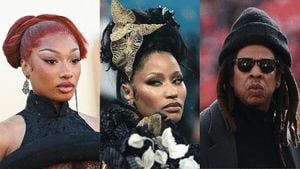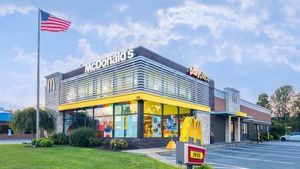On Tuesday, July 8, 2025, a significant chapter in UK-France relations was written as French President Emmanuel Macron began a three-day state visit to the United Kingdom. Marking the first visit by an EU head of state since Brexit in 2020, and the first by a French president since Nicolas Sarkozy in 2008, the occasion was steeped in historical symbolism and forward-looking diplomacy.
The arrival of President Macron and his wife, Brigitte, was warmly greeted by the British Royal Family at RAF Northolt in west London. Prince William and Catherine, Princess of Wales, personally welcomed the French dignitaries on the tarmac, underscoring the importance of the visit. Macron himself had announced the trip on X, formerly Twitter, calling the UK a "strategic partner, an ally, a friend," and emphasizing the longstanding bond "forged by History and strengthened by trust." This sentiment set the tone for the visit.
The Royal welcome continued with pomp and ceremony at Windsor Castle. King Charles III and Queen Camilla greeted the Macrons with a 41-gun salute from Home Park. The entourage then proceeded on a royal carriage procession through Windsor, where streets were festooned with both French Tricolore and British Union flags. The King and Queen, along with the Princess and Prince of Wales, joined the French president and his wife in a state banquet held in the vast medieval St George's Hall, attended by around 160 guests including UK Prime Minister Keir Starmer and music legends Elton John and Mick Jagger.
King Charles III used the banquet as an opportunity to highlight the enduring and evolving alliance between the UK and France. Speaking to the gathered dignitaries and celebrities, he alternated between French and English, emphasizing that the friendship between the two nations was "essential in order to preserve our freedoms and peace in Europe." He rebranded the historic "Entente Cordiale" as the "Entente Amicale," a friendship not just cordial but warm and sincere. "As we dine here in this ancient place, redolent with our shared history, allow me to propose a toast to France and to our new Entente," he declared, noting the complex threats both countries face, from terrorism to irregular migration.
The King's speech was sprinkled with lighter moments, including a joke about the French cartoon character Asterix the Gaul's confusion over Britons' love of tea with milk and a mention of "English sparkling wine made by a French Champagne house," a nod to the champagne served at the banquet, crafted by Taittinger. He also celebrated the cultural ties that bind the two countries, citing examples like Monet's paintings of London fog and Thierry Henry, the French footballer who made his mark at Arsenal.
President Macron, in turn, lauded this "entente amicale that unites our two fraternal peoples in an unwavering alliance." In a wide-ranging half-hour address to the UK Parliament, delivered mostly in English, he underscored the necessity of joint action to defend the post-World War II international order. He pledged that European countries would "never abandon Ukraine" amid its ongoing war with Russia and called for an unconditional ceasefire in Gaza. Macron also urged the UK to collaborate with France on recognizing a Palestinian state, calling it "the only path to peace." Touching on Brexit, he described the UK's departure as "deeply regrettable" but acknowledged that the 2016 referendum's result was respected internationally.
Macron's speech also included a light-hearted jab about the Bayeux Tapestry loan, joking that it "probably took more years to deliver this project than all the Brexit talks," before confirming that the 11th-century embroidery depicting the Norman conquest of England would be loaned to the British Museum for ten months starting September 2026. This cultural exchange, in which France will loan the tapestry in return for ancient treasures from the Anglo-Saxon Sutton Hoo site, symbolizes the deep historical connections between the two nations.
On the political front, Macron and Prime Minister Keir Starmer met several times during the visit, with discussions focusing on aid to war-torn Ukraine, bolstering defence spending, and tackling the contentious issue of illegal migration across the English Channel. The Channel migration crisis remains a potent political issue in Britain, with Eurosceptic parties leveraging it to challenge the government. Macron acknowledged the challenge, calling cross-Channel migration "a burden for our two countries" and emphasizing the need for "cooperation" to address it.
Starmer is under pressure to secure a "one-in, one-out" migrant return deal with France, allowing the UK to send back migrants crossing the Channel in small boats in exchange for accepting asylum seekers with family connections in Britain. However, officials have yet to finalize the details ahead of the planned signing at the Franco-British summit scheduled for Thursday, July 10, 2025.
In addition to political and security talks, the visit aimed to boost economic and cultural ties. A significant announcement was made that French energy giant EDF would acquire a 12.5 percent stake in the new British nuclear power plant Sizewell C in Suffolk, the UK's second new nuclear facility in a generation. This move signals a strengthening of energy cooperation amid global concerns over energy security and climate change.
The cultural dimension of the visit was further highlighted by the planned loan of the Bayeux Tapestry, a priceless artifact that has not been on British soil for nearly a millennium. Macron reflected on this moment, saying, "For the first time in 900 years the Bayeux Tapestry will follow the same path as the warriors whose stories it tells and land on British soil." He saw the missing final scenes of the tapestry as "an even more powerful symbol in the great mural of Franco-British history, the end has yet to be written." The tapestry's arrival at the British Museum will be a major event, drawing attention to the intertwined histories of the two nations.
Throughout the visit, the presence of high-profile figures from culture and politics underscored the multifaceted nature of UK-France relations. The state banquet featured not only political leaders but also celebrities such as Sir Mick Jagger and Sir Elton John, both of whom have personal ties to France. The Princess of Wales, attending her first formal evening event since her cancer diagnosis, was elegantly dressed in a dark red silk gown by Givenchy, symbolizing the blend of British and French cultural influences. Chef Raymond Blanc OBE, a renowned French chef and ambassador for The King’s Foundation, prepared the first course and dessert for the banquet, further exemplifying the culinary collaboration between the two countries.
King Charles also touched on environmental concerns, noting that the "very future of our planet hangs in the balance" and emphasizing the critical role the UK and France have to play together. Macron echoed this, highlighting the necessity of cooperation on climate change alongside defence and migration issues.
As the visit progressed, the two leaders prepared to co-host the 37th Franco-British Summit on July 10, where defence ties and joint efforts to support a ceasefire in Ukraine would be high on the agenda. Britain and France are leading a 30-nation coalition exploring peacekeeping deployments and other measures to stabilize the region, with plans to engage Ukrainian President Volodymyr Zelensky, German Chancellor Friedrich Merz, and Italian Prime Minister Giorgia Meloni.
Despite some political opposition within the UK, including criticism from Conservative MPs like Suella Braverman, who called for Macron's departure over migration issues, the visit demonstrated a mutual commitment to strengthening ties. Macron’s message was clear: the UK and France share a common destiny, and only by working "hand in hand, shoulder to shoulder" can they overcome the complex challenges of the modern world.
In a world marked by geopolitical uncertainty, the renewed "Entente Amicale" between the UK and France stands as a testament to the enduring power of friendship, history, and cooperation. As King Charles toasted the future of this alliance, and Macron pledged unwavering partnership, the visit reaffirmed that, despite differences and past tensions, these two nations remain steadfast allies facing the future together.





